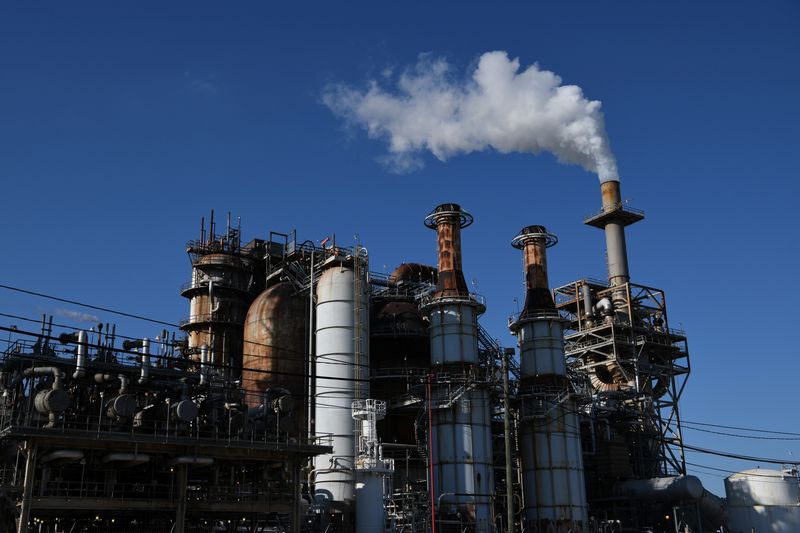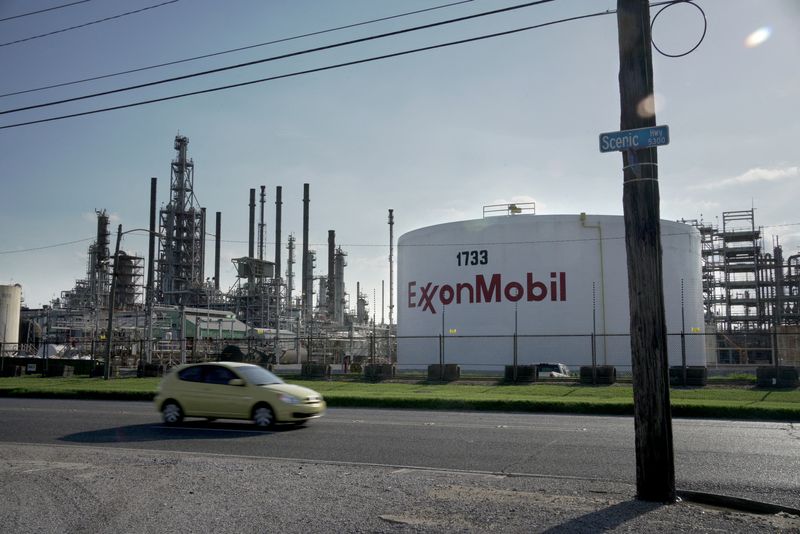By Laura Sanicola
(Reuters) -Refiners worldwide are struggling to meet global demand for diesel and gasoline, exacerbating high prices and aggravating shortages from big consumers like the United States and Brazil to smaller countries like war-ravaged Ukraine and Sri Lanka.
World fuel demand has rebounded to pre-pandemic levels, but the combination of pandemic closures, sanctions on Russia and export quotas in China are straining refiners' ability to meet demand. China and Russia are two of the three biggest refining countries, after the United States. All three are below peak processing levels, undermining the effort by world governments to lower prices by releasing crude oil from reserves.
Two years ago, margins for making fuel were in the dumps due to the pandemic, leading to multiple closures. Now, the situation has reversed, and the strain could persist for the next couple of years, keeping prices elevated.
"When the coronavirus pandemic occurred, demand for global oil was not expected to fall for a long time, and yet so much refining capacity was cut permanently," said Ravi Ramdas, managing director of energy consultancy Peninsula Energy.
Global refining capacity fell in 2021 by 730,000 barrels a day, the first decline in 30 years, according to the International Energy Agency. The number of barrels processed daily slumped to 78 million bpd in April, lowest since May 2021, far below the pre-pandemic average of 82.1 million bpd.
Fuel stocks have fallen for seven straight quarters. So while the price of crude oil is up 51% this year, U.S. heating oil futures are up 71%, and European gasoline refining margins recently hit a record at $40 a barrel.
STRUCTURALLY SHORT
The United States, according to independent analyst Paul Sankey, is "structurally short" on refining capacity for the first time in decades. U.S. capacity is down nearly 1 million barrels from before the pandemic to 17.9 million bpd as of February, the latest federal data available.
LyondellBasell recently said it would shut its Houston plant that could process more than 280,000 bpd, citing the high cost of maintenance.
Operating U.S. refiners are running full-tilt to meet demand, especially for exports, which have surged to more than 6 million bpd, a record. Capacity use currently exceeds 92%, highest seasonally since 2017.
"It's hard to see that refinery utilization can increase much," said Gary Simmons, Valero chief commercial officer. "We've been at this 93% utilization; generally, you can't sustain it for long periods of time."
The U.S. ban on Russian imports has left refiners in the northeast United States short of feedstocks needed to make fuel. Phillips 66 (NYSE:PSX) has been running its 150,000-bpd catalytic cracker at its New Jersey refinery at reduced rates because it cannot source low-sulfur vacuum gasoil, according to two sources familiar with the matter.
RUSSIA CAPACITY IDLED, CHINA RESTRICTING EXPORTS
Russia has idled about 30% of its refining capacity due to sanctions, according to Reuters estimates. Outages are currently about 1.5 million bpd, and 1.3 million bpd will likely stay offline through the end of 2022, J.P. Morgan analysts said.
China, the second-largest refiner worldwide, has added several million barrels of capacity in the last decade, but in recent months has cut production due to COVID-19 restrictions and capped exports to curb refining activity as part of an effort to cut carbon emissions. China's throughput dropped to 13.1 million bpd in April, the IEA said, down from 14.2 million bpd in 2021.
Other countries are also not adding to supply. Eneos Holdings, Japan's largest refiner, does not plan to reopen recently closed refineries, a spokesperson told Reuters.
Some new projects worldwide have been hit by delays. A 650,000-bpd refinery in Lagos was supposed to open by the end of 2022 but is now delayed until the end of 2023. A source with direct knowledge said the refinery has not yet hired a company to do commissioning work which will take several months.
There have been some restarts. French major TotalEnergies began the process of restarting the 231,000 bpd Donges refinery in April after shutting in December 2020, while a 300,000-bpd complex in Malaysia restarted earlier this month.
SUPPLY CRUNCH
Diesel users have been squeezed, particularly in agriculture. Ukrainian farmers are short, as supply from Russia and Belarus has been cut off due to the war.
Sri Lanka, which is in the midst of a fuel crisis, shut its only refinery in 2021 because it lacked sufficient foreign exchange reserves to buy imported crude. It is looking to reopen that facility because fuels are even more expensive.

Brazil's state-owned Petrobras told the government that importers may be unable to secure U.S. diesel for tractors and other farm equipment to harvest crops in one of the world's biggest agricultural producers.
“If refineries in the U.S. get damaged during hurricane season, or anything else contributes to the market’s tightness, we could be in real trouble," said a Brazilian refining executive.
